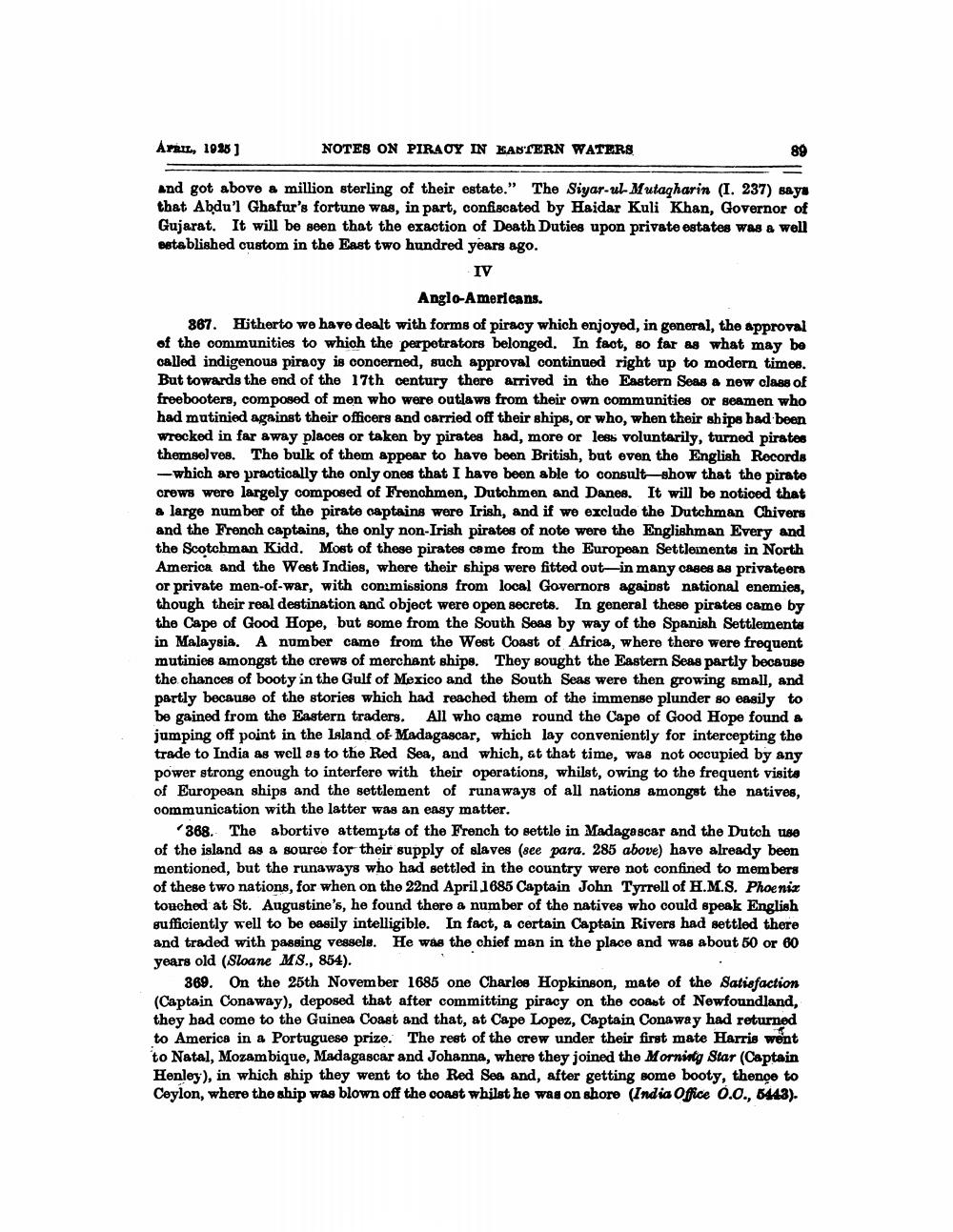________________
APRIL, 1925)
NOTES ON PIRA OY IN KAB'TERN WATERS
89
and got above a million sterling of their estate." The Siyar-ul-Mutagharin (I. 237) says that Abdu'l Ghafur's fortune was, in part, confiscated by Haidar Kuli Khan, Governor of Gujarat. It will be seen that the exaction of Death Duties upon private estates was a well Betablished custom in the East two hundred years ago.
IV
Anglo-Americans. 867. Hitherto we have dealt with forms of piracy which enjoyed, in general, the approval of the communities to which the perpetrators belonged. In fact, so far as what may be called indigenous piraoy is concerned, such approval continued right up to modern times. But towards the end of the 17th century there arrived in the Eastern Seas a new class of freebooters, composed of men who were outlaws from their own communities or seamen who had mutinied against their officers and carried off their ships, or who, when their ships bad been wrecked in far away places or taken by pirates had, more or less voluntarily, turned pirates themselves. The bulk of them appear to have been British, but even the English Rocords - which are practically the only ones that I have been able to consult show that the pirate crews were largely composed of Frenchmen, Dutchmen and Danes. It will be noticed that a large number of the pirate captains were Irish, and if we exclude the Dutchman Chivers and the French captains, the only non-Irish pirates of note were the Englishman Every and the Scotchman Kidd. Most of these pirates came from the European Settlements in North America and the West Indies, where their ships were fitted out-in many cases de privateers or private men-of-war, with con:missions from local Governors against national enemies, though their real destination and object were open secrets. In general these pirates came by the Cape of Good Hope, but some from the South Seas by way of the Spanish Settlements in Malaysia. A number came from the West Coast of Africa, where there were frequent mutinies amongst the crews of merchant ships. They sought the Eastern Seas partly because the chances of booty in the Gulf of Mexico and the South Seas were then growing small, and partly because of the stories which had reached them of the immense plunder so easily to be gained from the Eastern traders. All who came round the Cape of Good Hope found a jumping off point in the Laland of Madagascar, which lay conveniently for intercepting the trade to India as well os to the Red Sea, and which, at that time, was not occupied by any power strong enough to interfere with their operations, whilst, owing to the frequent visita of European ships and the settlement of runaways of all nations amongst the natives, communication with the latter was an easy matter.
368. The abortive attempts of the French to settle in Madagascar and the Dutch use of the island as a source for their supply of slaves (see para. 285 above) have already been mentioned, but the runaways who had settled in the country were not confined to members of these two nations, for when on the 22nd April 1685 Captain John Tyrrell of H.M.S. Phoenix touched at St. Augustine's, he found there a number of the natives who could speak English sufficiently well to be easily intelligible. In fact, a certain Captain Rivers had settled there and traded with passing vessels. He was the chief man in the place and was about 50 or 60 years old (Sloane M8., 854).
869. On the 25th November 1685 one Charles Hopkinson, mate of the Satisfaction (Captain Conaway), deposed that after committing piracy on the coast of Newfoundland, they had come to the Guinea Coast and that, at Cape Lopez, Captain Conaway had returned to America in a Portuguese prize. The rest of the crew under their first mate Harris went to Natal, Mozambique, Madagascar and Johanna, where they joined the Morning Star (Captain Henley), in which ship they went to the Red Sea and, after getting some booty, thenge to Ceylon, where the ship was blown off the coast whilst he was on shore (India Office o.o., 8443).




